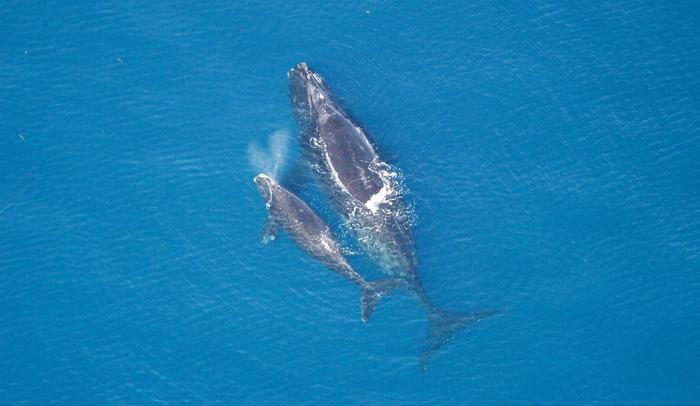72% of cetacean and pinniped stocks managed under US jurisdiction are highly or very highly vulnerable to climate change, according to a study published in PLOS ONE led by Matthew D. Lettrich at NOAA Fisheries, in Silver Spring, Maryland, United States of America.

Credit: NOAA, CC0 (https://creativecommons.org/publicdomain/zero/1.0/)
72% of cetacean and pinniped stocks managed under US jurisdiction are highly or very highly vulnerable to climate change, according to a study published in PLOS ONE led by Matthew D. Lettrich at NOAA Fisheries, in Silver Spring, Maryland, United States of America.
Climate change could affect the distribution, behavior, and movements of marine mammals via warming ocean temperatures, rising sea levels, decreasing dissolved oxygen, declining sea ice coverage, ocean acidification, and salinity changes. Climate vulnerability assessments (CVAs) provide a framework for evaluating climate impacts over a broad range of species. Prior to the study, no known CVAs specifically assessed US-managed marine mammals. To better understand climate-related threats to marine mammals, researchers conducted a trait-based CVA of 108 United States marine mammal stocks in the western North Atlantic, Gulf of Mexico, and Caribbean Sea. Researchers assigned scores to each marine mammal stock under two separate categories: (1) degree of exposure to climate change; and (2) sensitivity and capacity to adapt to climate change. Climate exposure was scored using 16 factors likely to affect marine mammals, their prey, and/or their habitat. Researchers also analyzed species’ ability to tolerate or adapt to climate-induced environmental changes.
The researchers found that 72% of United States cetacean (whales, dolphins, porpoises) and pinniped (seals, sea lions, walruses) stocks are highly or very highly vulnerable to climate change; 44% of marine mammal stocks had a “very high” climate vulnerability score. Baleen whales, toothed whales, medium-sized whales, and dolphins were among the marine mammals found to be most vulnerable to climate change impacts. Ocean temperature, acidity, and dissolved oxygen were the primary drivers of high climate exposure, altering availability of prey and habitat for these species. The researchers also noted that changes in water pH and temperature can change sound absorption and transmission, affecting echolocation among species who use it for communication, hunting, and foraging.
According to the authors, “These results provide information for researchers, managers, and the public on marine mammal responses to climate change to enhance the development of more effective marine mammal management, restoration, and conservation activities that address current and future environmental variation and biological responses due to climate change. This vulnerability assessment provides a tool that can complement other marine mammal assessment techniques and support the broader implementation of protected species and ecosystem management and conservation as the climate changes.”
The authors would like to see the marine mammal CVA repeated when enhanced input data is available, such as higher-resolution climate projections and better species-specific biological information.
Lettrich adds: “Using a systematic approach allowed us to look across all of these stocks and better understand what drives their vulnerability to climate change. We can now go out and look at some of these individual responses to climate change, and explore approaches to reduce the impacts of climate change on these vulnerable populations.”
#####
In your coverage please use this URL to provide access to the freely available article in PLOS ONE: https://journals.plos.org/plosone/article?id=10.1371/journal.pone.0290643
Citation: Lettrich MD, Asaro MJ, Borggaard DL, Dick DM, Griffis RB, Litz JA, et al. (2023) Vulnerability to climate change of United States marine mammal stocks in the western North Atlantic, Gulf of Mexico, and Caribbean. PLoS ONE 18(9): e0290643. https://doi.org/10.1371/journal.pone.0290643
Author Countries: USA, Canada
Funding: This project was funded by the NOAA Fisheries Office of Science and Technology. ECS Federal, Inc in support of NOAA NMFS Office of Science and Technology provided salary for author MDL. This research was carried out [in part] under the auspices of the Cooperative Institute for Marine and Atmospheric Studies (CIMAS), a Cooperative Institute of the University of Miami and the National Oceanic and Atmospheric Administration, cooperative agreement # NA20OAR4320472 (AG, KMF, NLV). The funders had no role in study design, data collection and analysis, decision to publish, or preparation of the manuscript.
Journal
PLoS ONE
DOI
10.1371/journal.pone.0290643
Method of Research
Observational study
Subject of Research
Animals
Article Title
Vulnerability to climate change of United States marine mammal stocks in the western North Atlantic, Gulf of Mexico, and Caribbean
Article Publication Date
20-Sep-2023
COI Statement
The authors have declared that no competing interests exist.




